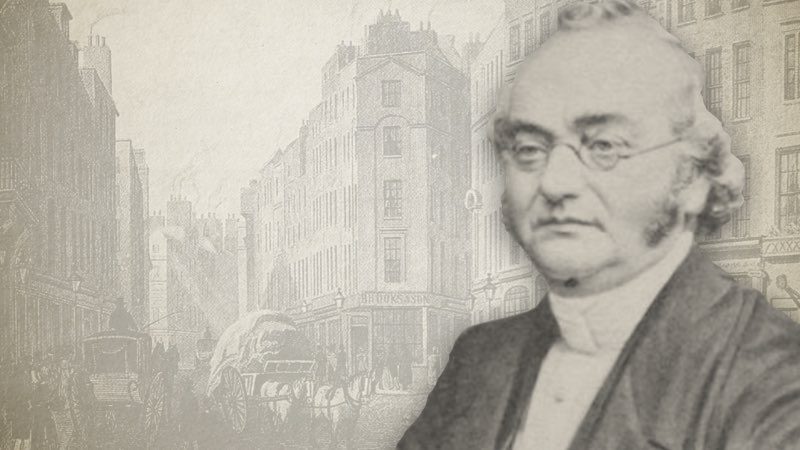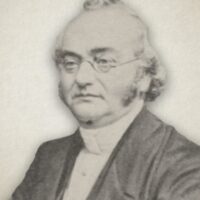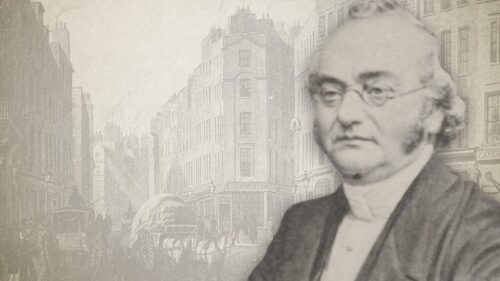
The Dying Testimony Of The Late Mr. Abrahams To The Eternal Sonship Of Christ
Gospel Standard 1871:
About two months before his decease, Mr. Abrahams preached a sermon from Song 5:16: “His mouth is most sweet.” Speaking of the glorious Person of the Son of God, he says, Now, then, regarding the Person the church is speaking about. Say you, “Well, I suppose nobody will have much trouble to know that?” Well, perhaps they may not; but still the Lord gives ministerial ability to talk a little to the poor children about him; and Christians, when they do talk about him, like to hear and bless God for it. You will agree with my way of preaching, that, in the first place, we ought to know his personal beauty and glory; and, secondly, there is evidently the relationship of his Person in the text, and what that is.
In the first place, then, his personal glory should never be left out of a discourse; for he is the eternal, co-equal, co-glorious Son of God, in majesty and in power, the Creator of all things, and by whom everything was made and created, and for his own glory; consequently, the eternal Son of God is by the church always worshipped. If he were not God we should be idolaters to worship him, to love him, to give him the adoration he demands from the church of the living God. Therefore, whoever denies his eternal Godhead is a dire heretic; and if he dies so he will be damned. He is, then, in his Person the eternal Son of God. He never was made the Christ of God at all. For this is a little mistake that many good men make. The Christ of God, you must understand, signifies the Son of God incarnate and anointed with the fulness of the Holy Ghost. For the word Christ in the Hebrew is as you have it in the second Psalm: “Yet have I set my King” (“anointed” in the margin). The Greek word Christ signifies also “the anointed;” it is plainly the anointed of the Lord, and, therefore, God did not want anointing in his Godhead. As the eternal Son of God, all the eternal Deity of the Godhead dwells in him personally. As is the Father, so is the Son and so is the Holy Ghost. The Father eternal, the Son eternal, and the Holy Ghost eternal; and yet they are not three eternals, but one eternal Jehovah.
“I cannot understand it,” says the Socinian. “Understand yourself first, fool.” Can you understand yourself? Did you ever read in the Bible that God must be worshipped because you can understand him? It is not common sense; and yet you profess to be logical and philosophical, you Socinians, if there are any here. For a finite being to comprehend an infinite Being is nonsense. Neither do you read in God’s word that you are to comprehend him; but all that you read is that you are to acknowledge what he reveals himself to be: “To the acknowledgment of the mystery of God, and of the Father, and of Christ.” That is all. For an incomprehensible Being to be comprehended by a finite being is to tell a child to take up this chapel in his arms and run away with it. So much, then, for that matter.
Again. The Son of God, if he were not the eternal Jehovah, how could he speak such awful words unto the poor man when he asked who he was. He said, “Thou knowest. I AM,” was the reply. And he fell down and worshipped him. But his incarnation did not make him less the Son of God or less the eternal Jehovah. He was Jehovah in the virgin’s womb, in his human nature, upon the cross, in the grave. He was Jehovah through the whole of it.
Again. He is perfect God and Man, yet not two Christs; for his Personality remains the same, and his taking of human nature did not make another person. That would introduce a very ancient error. Where my dear brethren (Jews) are in captivity (in Abyssinia), they hold this heresy. They profess to be Christians there, and yet hold this heresy of two Christs. Well, we who are taught of God must not do so. I tell you he took a nature which had no personality; hence the Holy Ghost is very particular, and says, “That holy thing” (not “that holy person”) which shall be born of thee, being united to the Son of God, shall be called Immanuel; and never shall be altered; for the gifts and callings of God are without repentance.
George Abrahams (1800-1867) was a Particular Baptist preacher. He was appointed pastor of the church meeting at Regent-Street Chapel, City Road. As a Polish Jew, he enjoyed a distinguished ministry in London, his accent alone setting him apart from his co-labourers in the gospel. He belonged to the Hight-Calvinist section of churches.




